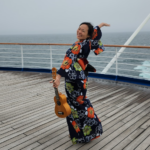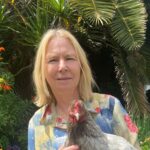Chat with a GET Teacher! Vol.17 Ari
ピースボートのクルーズにGETプログラムの英語/スペイン語ボランティア講師として乗船してくれた方たちへのインタビュー、“ChatWith a GET Teacher! (GETの先生とおしゃべり)”。
世界中から参加し、多様で豊かなバックグラウンドを持ったGETの先生たち。
そんな先生たちがどうしてピースボートへ参加したのか、ピースボートでどんなことを感じたのか、現在は何をしているのかを聞いていきます。
第17弾の今回は、ピースボートV116にスペイン語講師として参加した Ari(アリ)のインタビューをお届けします!
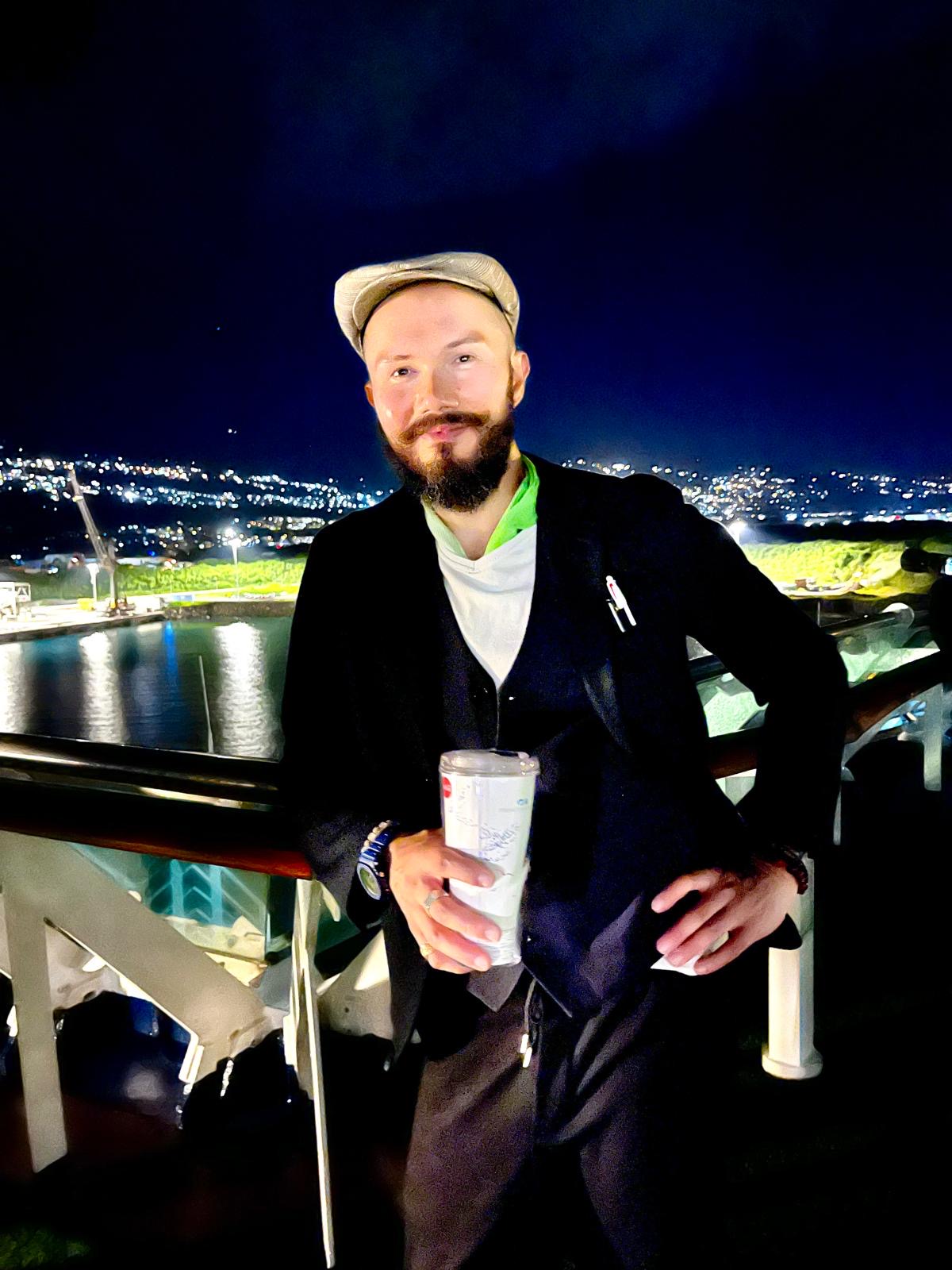
1. What were you doing before joining Peace Boat?
ピースボートに乗船する前は何をしていましたか?
I was taking a career break after many years in high school education. Before that, I worked at an international school in Sweden as a Spanish and EAL teacher, as well as a mentor.
高校教育に長年携わった後、キャリアブレイクを取っているところでした。それ以前は、スウェーデンのインターナショナルスクールでスペイン語とEALの教師、メンターとして働いていました。
2. How did you find out about Peace Boat or the GET programme, and why did you come on board?
ピースボートやGETプログラムを知ったきっかけと、乗船した理由を教えてください。
Sometime in the 2010s, I came across an online ad about joining Peace Boat as a volunteer language teacher. The idea of teaching while traveling the world immediately resonated with me, and I knew I wanted to take part in it someday. At the time, I couldn’t apply, but I promised myself that one day, I would.
I had wanted to apply for years, but it was never the right time due to conflicts between the school year calendar and the length of the voyages. However, my fascination with Japanese culture and global travel never faded. The opportunity to teach while exploring Japan and other cultures was incredibly appealing, and when the timing finally worked out, I knew I had to go for it.
2010年代のある日、ボランティアの語学講師としてピースボートに参加できるというオンライン広告を見つけました。世界を旅しながら教えるというアイディアに直感的に惹かれ、いつか参加したいと思いました。その時は応募できませんでしたが、いつか応募しようと心に決めました。
何年もの間ずっと応募したかったのですが、学校の行事とクルーズの期間の兼ね合いでなかなかタイミングが合いませんでした。それでも、私の日本文化そして世界旅行への憧れは色褪せることはありませんでした。日本や他の文化を探求しながら教えられるという機会はとても魅力的で、ようやくタイミングが合ったとき、これは行くしかないと思いました。
3. What did you enjoy most about being a GET Teacher?
GETの先生になって一番楽しかったことは何ですか?
There were so many things I loved! I truly enjoyed working with a passionate and dynamic team, as well as with highly motivated, engaged, and enthusiastic students. It was incredible to see my students’ progress in such a short time. Teaching is always a two-way process—I learned so much from my students as well. Their cultural insights, travel experiences, life lessons, and perspectives on health and well-being enriched my own understanding of their culture.
大好きなことがたくさんありました!情熱的でダイナミックなチーム、そしてとても意欲的で熱心な生徒たちと一緒に取り組めることは本当に楽しかったです。短期間で私の生徒たちは信じられないほど上達しました。教えるということは常に双方向のプロセスです。私は私の生徒たちからたくさんのことを学びました。彼らの文化についての深い理解、旅行経験、人生訓、健康と幸福に対する視点は、私自身の彼らの文化に対する理解を豊かにしてくれました。
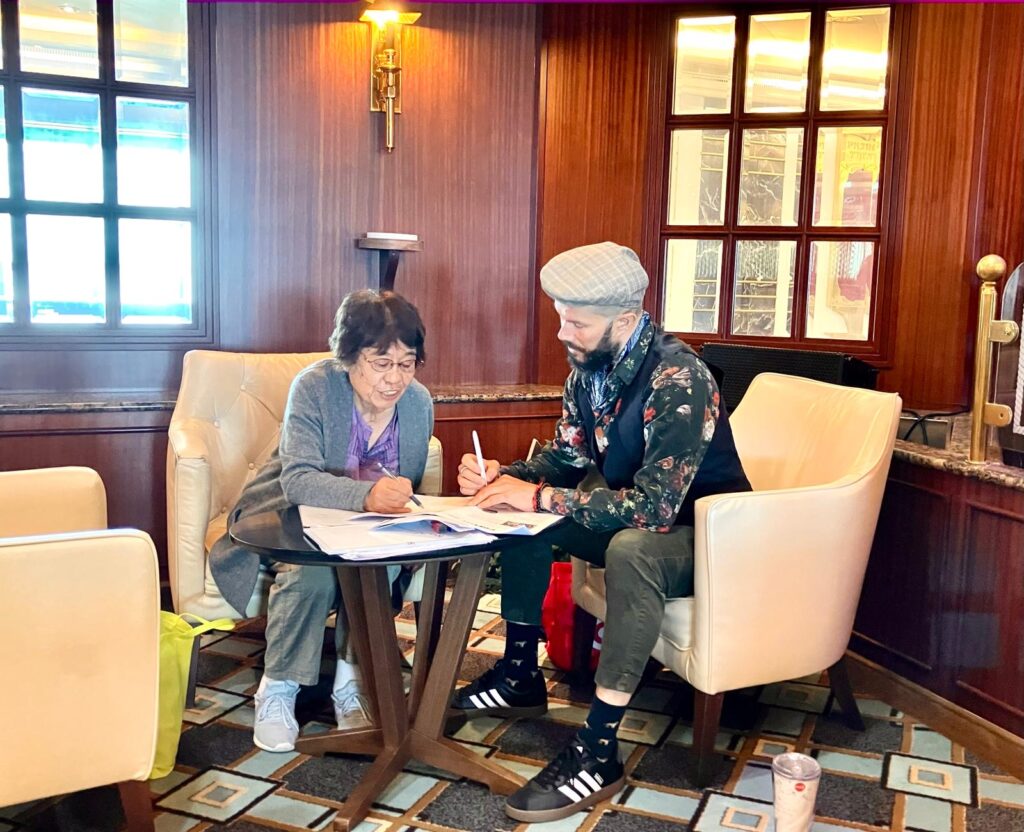
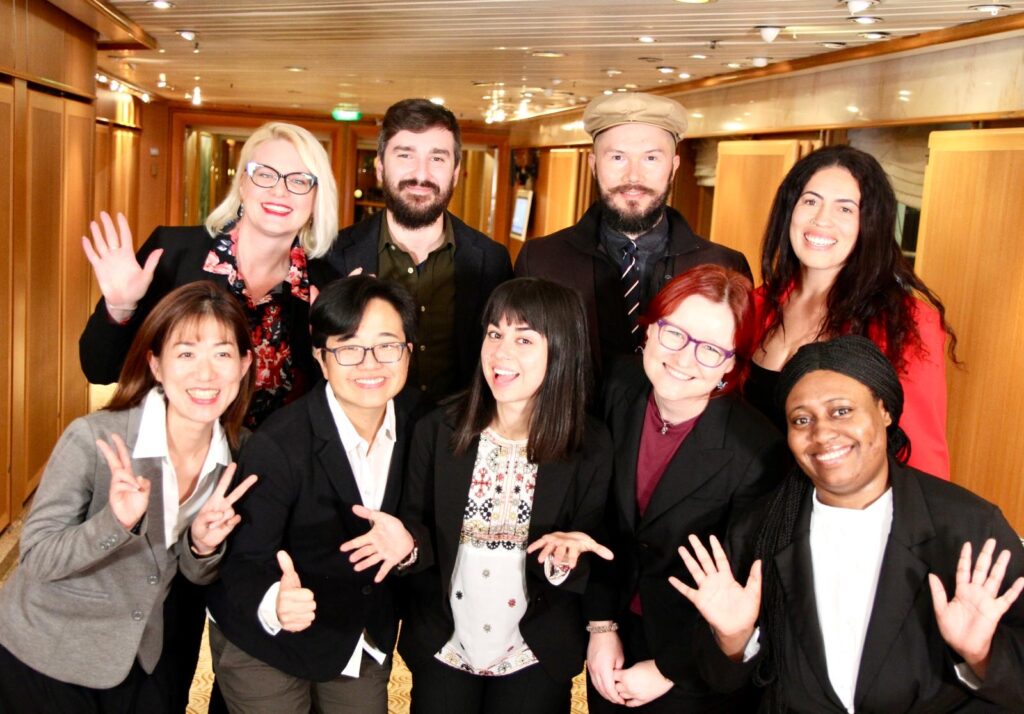
4. How did you spend your time on board? Did you organize any events, and if so, what were they?
船内ではどのように過ごしましたか?もしイベントを企画していたのなら、どんなものを企画しましたか?
When I wasn’t teaching, I engaged in a variety of activities. I attended many cultural events and lectures organized by Peace Boat, and I also ran three different types of events multiple times: yoga sessions, chess gatherings, and general knowledge quizzes. It was incredibly fun and rewarding!
レッスン以外の時間は、さまざまな活動に取り組みました。ピースボートが主催する文化的なイベントや講演にもたくさん参加し、私自身も3種類のイベントを行いました。ヨガ、チェスの集まり、そして一般常識クイズです。とても楽しく、やりがいがありました!
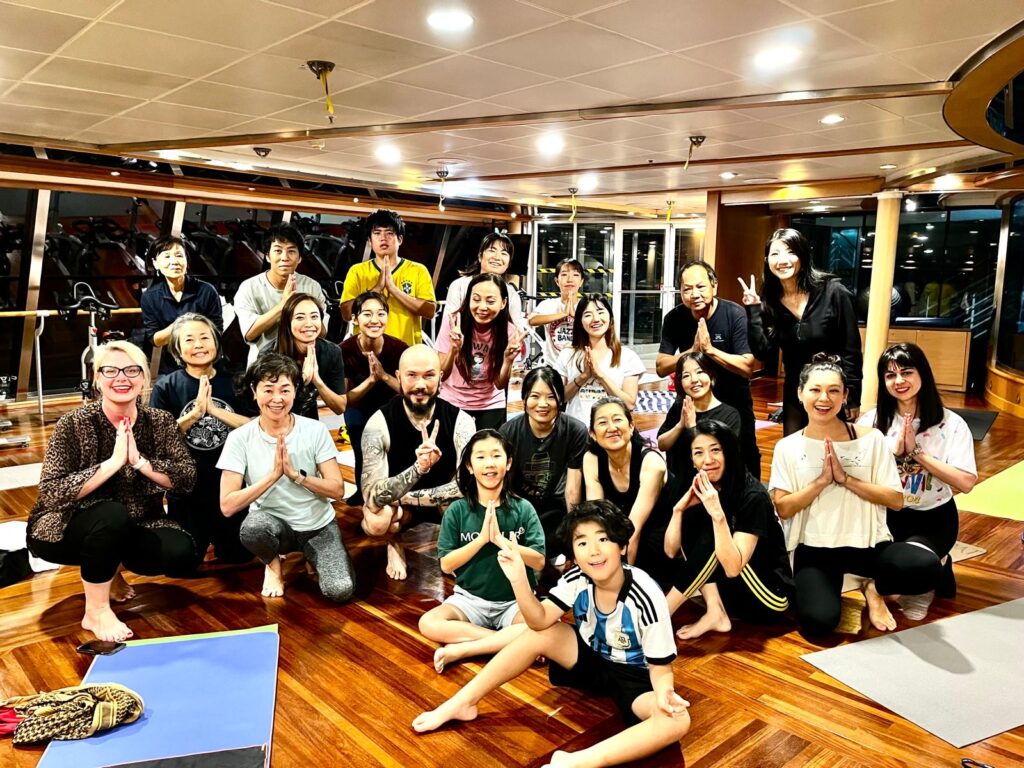
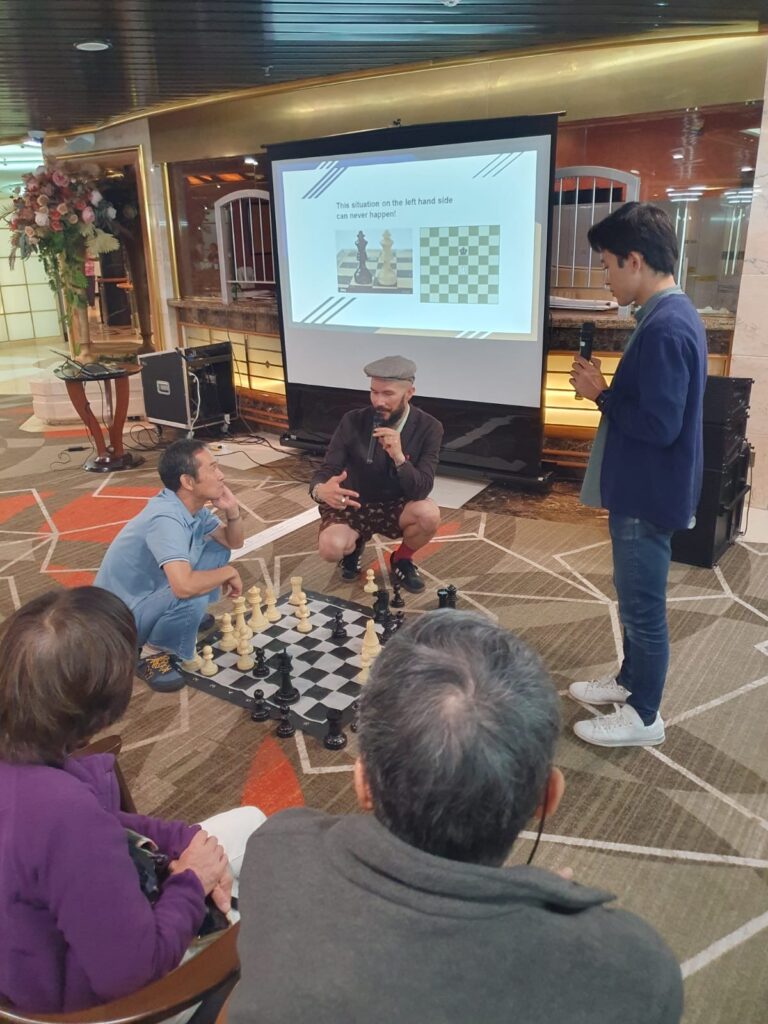
5. What was your favorite onboard event or encounter?
船内でのお気に入りの出来事や出会いを教えてください。
As a language teacher, I’d have to say the Speech Festival towards the end of the voyage. Our GET students delivered incredible speeches in their target language in front of a large audience. They performed amazingly well, and we—the GET team—were incredibly proud of them!
In general, one of the most beautiful aspects of the journey was the positive and kind-hearted atmosphere on the ship. Everyone shared at least two things in common: a passion for travelling and a global mindset. That created a strong sense of connection among us all.
語学講師としては、クルーズの終盤に行われたスピーチ・フェスティバルを挙げなければなりません。GETの生徒たちは、それぞれの学習言語で大勢の皆さんの前で素晴らしいスピーチを披露しました。彼らの発表は本当に素晴らしく、私たちGETチームは彼らをとても誇りに思いました!
総じて、この旅の最も素晴らしかった点は、船内の前向きで心優しい雰囲気でした。誰もが少なくともふたつの共通点、旅への情熱とグローバルな考え方を持っていました。それが私たち全員の間に強いつながりを生み出していたのです。
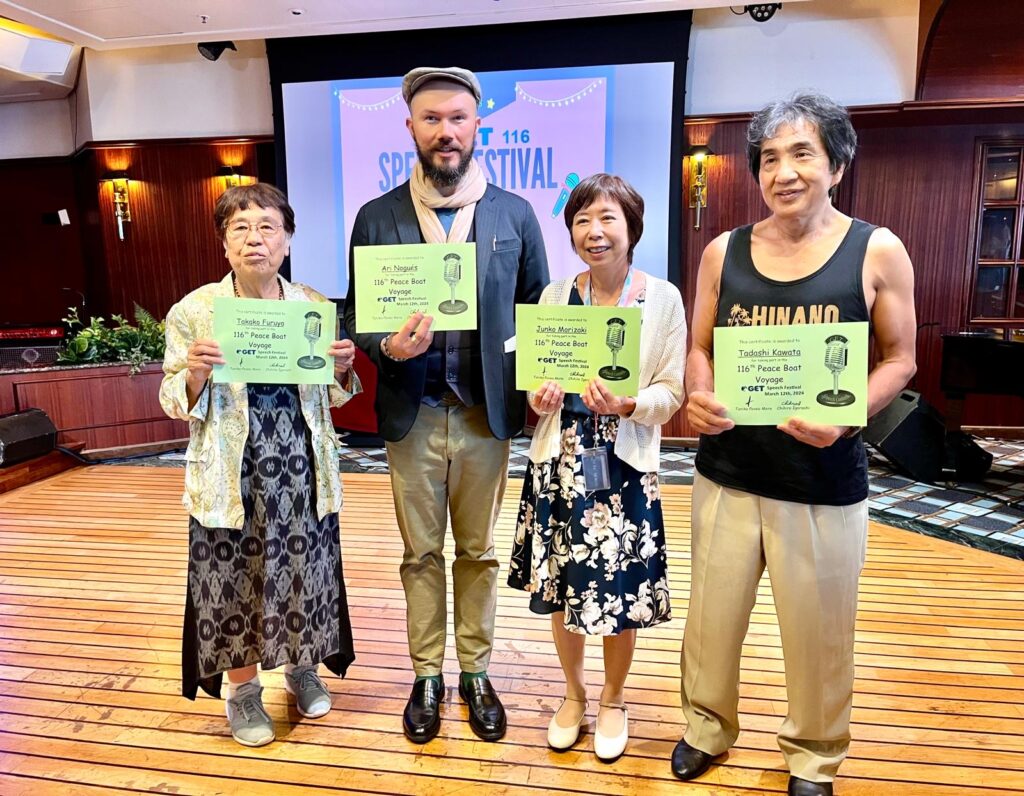
6. What was your favorite port and what did you do there?
お気に入りの寄港地はどこで、何をしましたか?
Probably Rapa Nui. I had always seen it on the map as a place I would probably never have the opportunity to visit because of how remote it is! Being able to set foot on the island was truly special.
Rapa Nui is an extraordinary destination that combines mystery, history, natural beauty, cultural richness, and resilience. My colleagues and I visited Rapa Nui National Park, where a local guide shared deep insights into the island’s history, culture, and people. It was an unforgettable experience.
おそらくラパ・ヌイ(イースター島)です。あまりに辺鄙な場所にあるので、自分が訪れることはないだろうとずっと地図上で見ていました!島に足を踏み入れることができたのは本当に特別なことでした。
ラパ・ヌイは、神秘、歴史、美しい自然、豊かな文化、そして回復力を併せ持つ特別な場所です。同僚と私はラパ・ヌイ国立公園を訪れ、現地ガイドが島の歴史、文化、人々について深い見識を語ってくれました。忘れられない体験です。
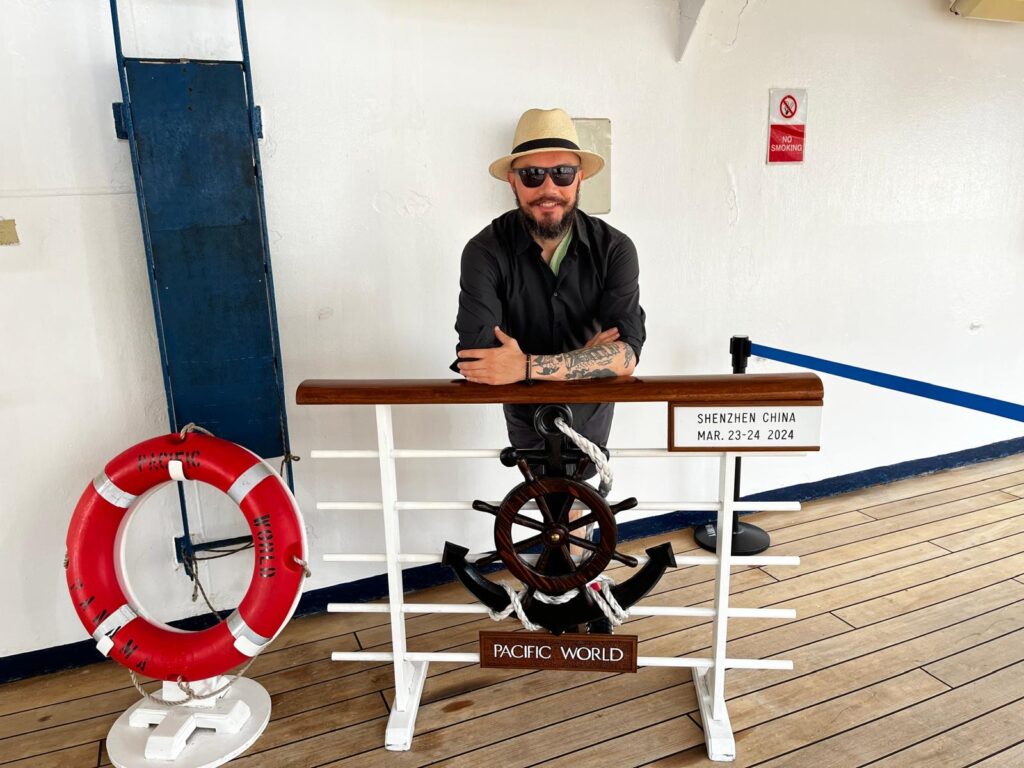
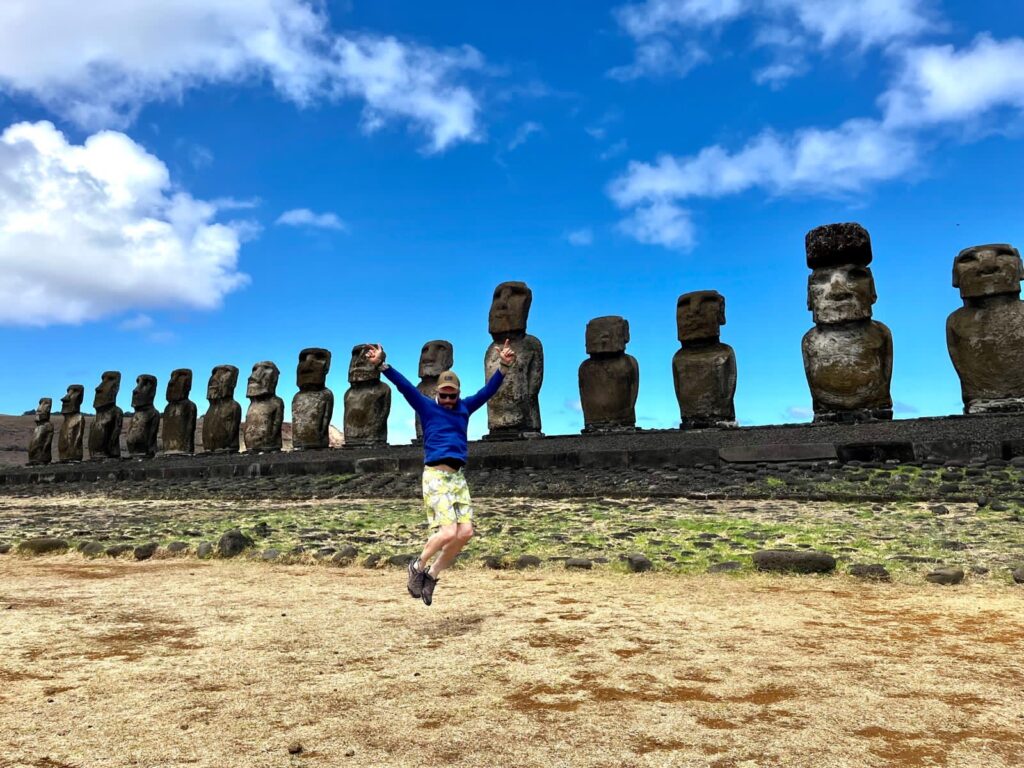
7. What did you gain from your time with Peace Boat?
ピースボートで過ごした時間から得たものは?
So much! First, a global voyage is truly the adventure of a lifetime—waking up to the ocean view every day and exploring multiple countries in one journey is simply amazing.
Beyond that, I gained deep cultural exchanges, life-changing experiences, and lifelong friendships. As a teacher, this journey reinforced the power of real-life language immersion—what we discussed in class often became real the next day in a completely new country. Learning was happening everywhere, at any time—not just in the classroom.
Finally, I found immense satisfaction in knowing that I contributed to language education as a tool for social change, empowering students to connect with the world through communication. And, of course, on a personal level, this experience helped me grow in many ways!
たくさんあります!まず第一に、世界一周旅行はまさに生涯忘れられない冒険です。毎日海の景色で目を覚まし、一度の旅で複数の国を訪れたことは、ただただ素晴らしい体験でした。
それ以上に、深い文化交流、人生を変えるような経験、そして生涯続く友情を得ることができました。講師として、この旅は実生活での言語没入法の力を強化してくれました。レッスンで話したことが、翌日、まったく新しい国で現実のものとなることがよくありました。学びは教室の中だけでなく、いつでもどこにでもありました。
最後に、私は自分の生徒たちにコミュニケーションを通して世界とつながる力をつけたことを通じて、自分が社会変革のツールとして言語教育に貢献したと感じ、大きな満足感を得ることができました。そしてもちろん、個人的なレベルでも、この経験はさまざまな面で私を成長させてくれました!
8. Where are you now and what do you do?
今はどこにいて、何をしていますか?
I currently live in Sweden, where I work as an online teacher and interpreter.
現在はスウェーデンに住み、オンライン講師と通訳をしています。
9. What advice would you give to future teachers?
未来の先生たちへのアドバイスをお願いします。
As cultural ambassadors, I encourage future GET teachers to:
a) Build bridges through language and culture.
b) Stay open-minded and flexible—ship life is unpredictable, so adaptability is key!
c) Make the most of every port and the onboard community.
d) Stay present and reflect on the experience. This journey is unique, so take it all in and appreciate every moment.
文化大使として、私は将来のGETの先生たちに次のことを勧めます:
a) 言語と文化を通じて架け橋となる。
b) オープンマインドと柔軟性を保つこと。船の生活は予測不可能なので、適応力が鍵です!
c) すべての寄港地と船内のコミュニティを最大限に活用すること。
d) 今にとどまり、経験を振り返る。この旅は唯一無二のものなので、すべてを受け入れ、一瞬一瞬に感謝すること。
10. What advice can you give to a student who wants to improve their English/Español?
英語/スペイン語を上達させたいと思っている生徒さんへのアドバイスをお願いします。
As a language learner myself, here are my top tips:
1. Practice daily! Even if you only have 15 minutes per day, be consistent. Those 15 minutes add up to 5,475 minutes per year!
2. Listen to yourself speaking. Read aloud or have small conversations. This will build confidence and fluency.
3. Learn vocabulary and grammar in context. Try to associate new words with real-life situations that matter to you—it makes them easier to remember.
4. Make learning fun and interactive. Use apps, hobbies, TV shows, music, books, people, short stories, travel documentaries, or anything that excites you. Ask yourself: What do I enjoy? Then apply that to your language learning.
私自身が語学学習者なので、以下が私のおすすめのコツです:
1. 毎日練習すること!たとえ1日15分しか時間がなくても、継続しましょう。その15分の積み重ねが、年間5,475分になります!
2. 自分が話しているのを聞く。声に出して読んだり、ちょっとした会話をしましょう。自信と流暢さが身につきます。
3. 文脈の中で語彙と文法を学ぶ。自分にとって重要な現実の状況と新しい単語を関連づけるようにしましょう。
4. 楽しく双方向に学ぶ。アプリ、趣味、テレビ番組、音楽、本、人物、短編小説、旅行ドキュメンタリーなど、あなたが楽しめるものなら何でも使ってください。自分に問いかけてみましょう: 自分は何を楽しんでいるのか?そして、それを言語学習に応用しましょう。
11. Do you have a message for your students?
自身の生徒さんたちへのメッセージをお願いします。
¡Muchas gracias! / Thank you for being such amazing students! I truly enjoyed teaching you and learning from you. Keep up the great work, keep having fun with your learning, and of course—never stop traveling!
¡Muchas gracias!(スペイン語で本当にありがとう!)/ 素晴らしい生徒でいてくれてありがとうございました!私は皆さんに教え、皆さんから学ぶことを心から楽しみました。そしてもちろん、旅することをやめないでください!
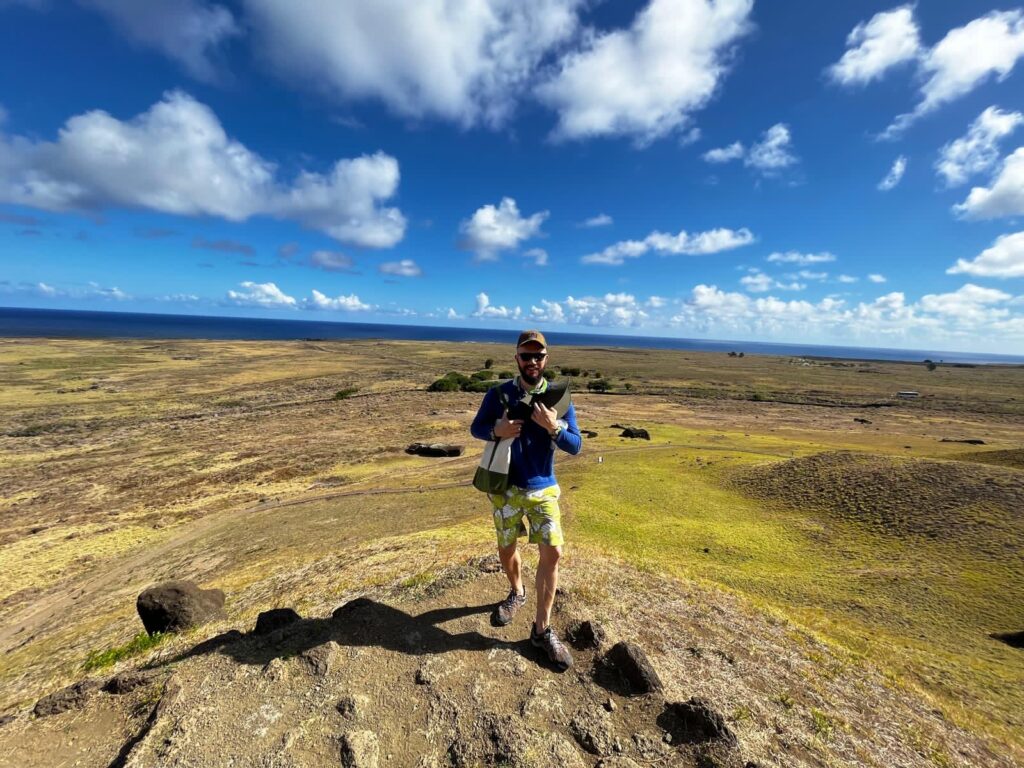
Thank you, Ari!!

